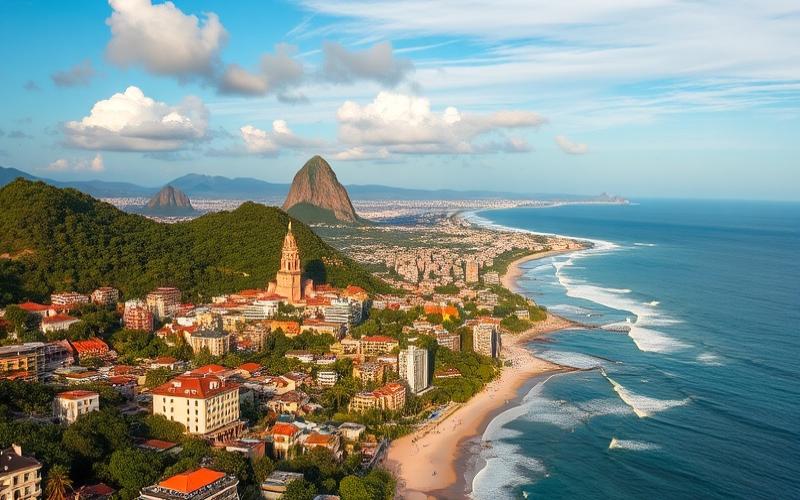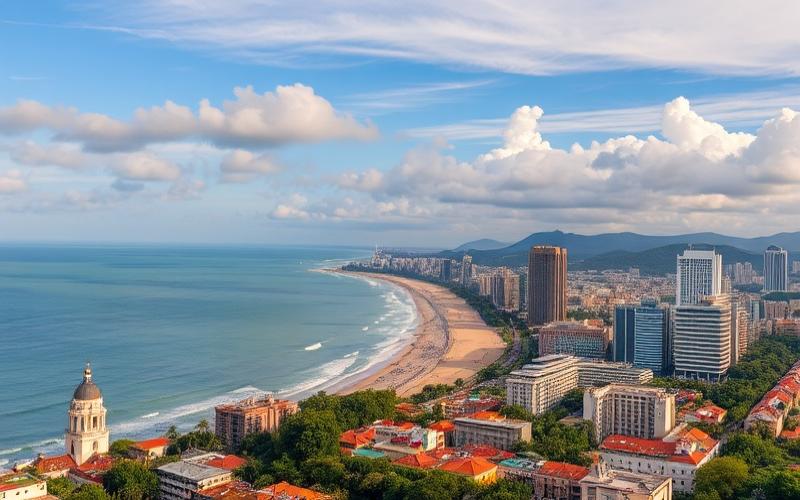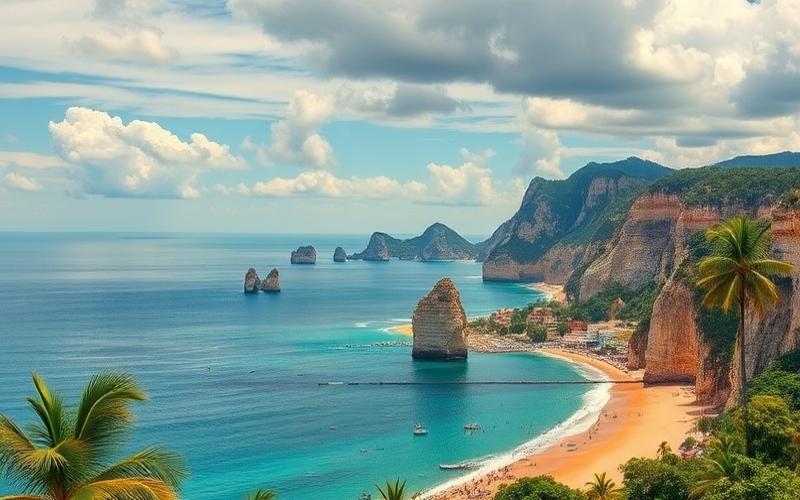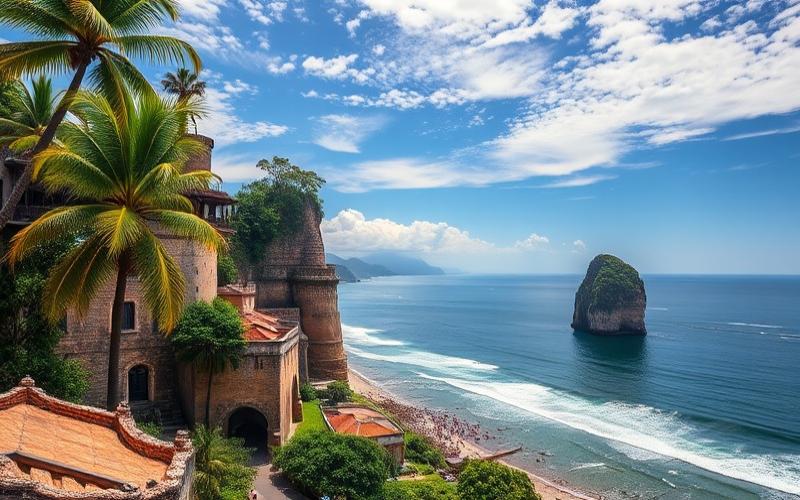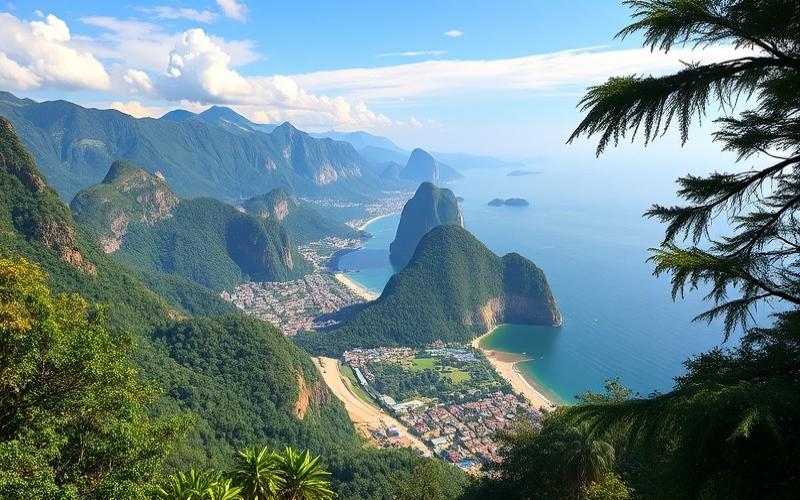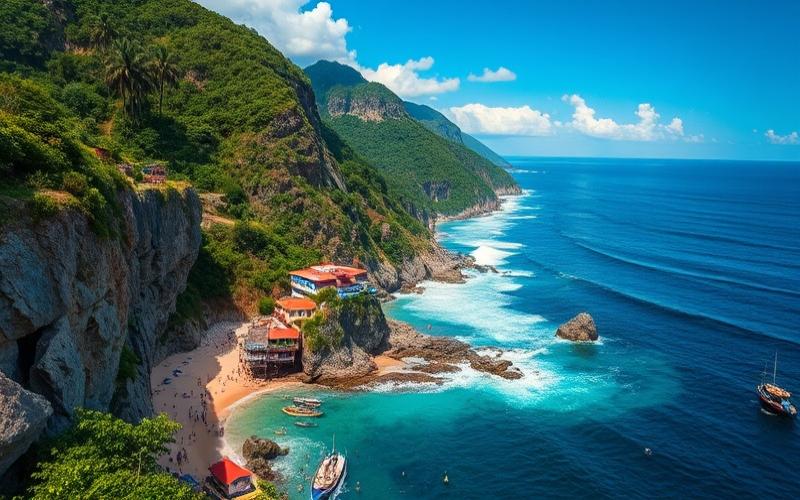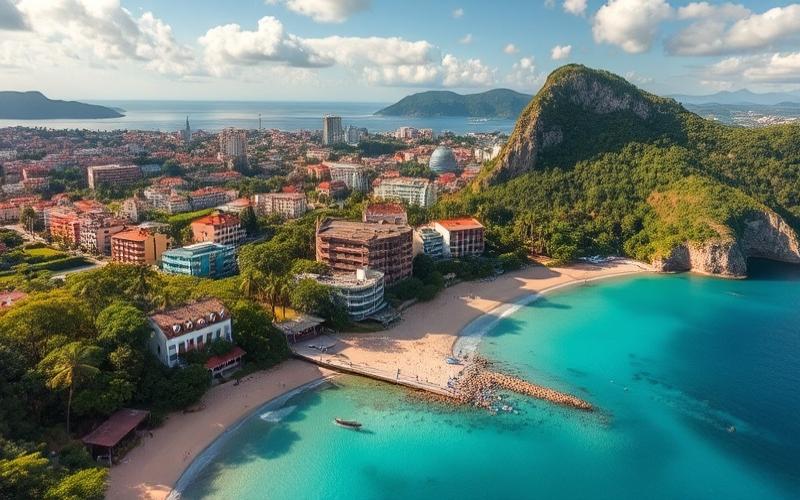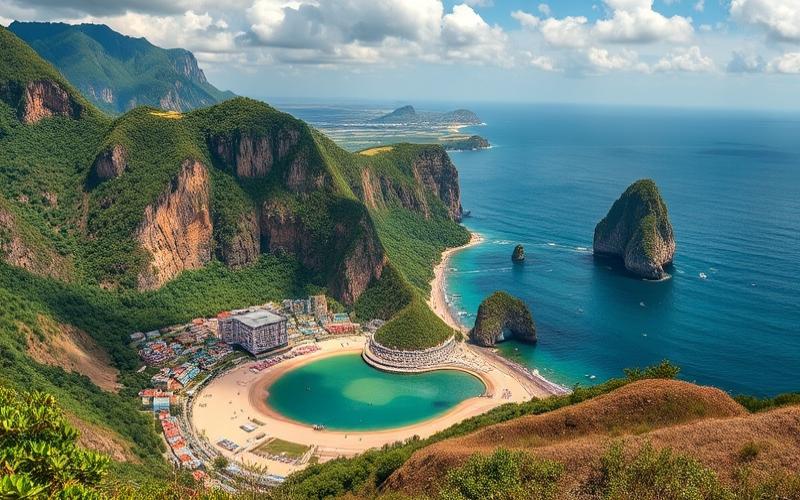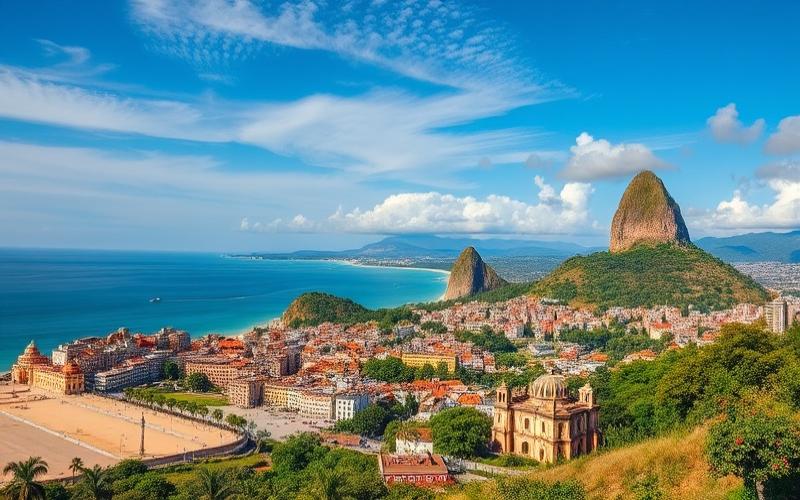
 Published on and written by Cyril Jarnias
Published on and written by Cyril Jarnias
Immersing yourself in a new culture can be a fascinating adventure, and Brazil, with its diversity and vibrancy, is no exception. For expatriates wishing to understand local religious practices, it’s essential to look beyond stereotypes and explore the multitude of beliefs and traditions that shape Brazilians’ daily lives.
From the unique syncretism of Afro-Brazilian religions like Candomblé and Umbanda, to popular expressions of Catholicism, every rite and celebration tells a story of cultural fusion and spiritual richness.
This guide aims to accompany those settling in Brazil in discovering these practices, offering them keys to foster integration, mutual respect, and personal enrichment in this country where religion colors even the smallest aspects of social and cultural life.
Impact of Religious Practices on Daily Life in Brazil
Major Religious Practices in Brazil
| Religion | Main Characteristics | Influence on Daily Life |
|---|---|---|
| Catholicism | Portuguese colonial heritage, majority of population | Major religious holidays, official calendar, family rituals |
| Evangelical Protestantism | Recent growth, numerous independent churches | Community celebrations, social and family involvement |
| Spiritism (Kardecism) | Allan Kardec’s doctrine, belief in reincarnation and communication with spirits | Mediumship practices, moral support, influence on mental health |
| Candomblé and Umbanda | Afro-Brazilian religions, syncretism with Catholicism, worship of orixás/entities | Offerings, public ceremonies, syncretic festivals, rituals in terreiros |
Influence on Daily Life
Religious Festivals
- Christmas, Easter, Corpus Christi: national holidays, major family gatherings.
- Feast of Iemanjá (February 2): processions and offerings on beaches for the sea goddess, particularly in Salvador.
- Festa Junina (Saint John): popular celebrations mixing Catholic elements and rural customs.
- Black Consciousness Day (November 20): commemorates African heritage, linked to Afro-Brazilian religions.
Rituals and Public Practices
Sunday masses, processions, baptisms, weddings, and funeral wakes structure family life.
Offerings of food, flowers, and candles in public spaces, particularly in Umbanda and Candomblé.
Dances, songs, and community meals during Candomblé ceremonies.
Impact on Work Days and Cultural Habits
Many holidays are linked to the Catholic calendar.
Some businesses adjust their hours during major religious festivals.
Eating habits and dress codes may be influenced during certain rituals (e.g., dietary restrictions during Lent).
Role in Family and Community Relations
Religion often structures family relationships: baptism, religious marriage, house blessings.
Evangelical churches play a strong social role in working-class neighborhoods: material support, mutual aid, activities for children and teenagers.
Candomblé terreiros and spiritist centers are also places of community support and solidarity.
Religious festivals are opportunities to strengthen intergenerational bonds and cultural transmission.
Influence on Politics and Education
Major denominations, particularly Catholicism and Evangelicalism, influence public debate, especially on social and ethical issues (abortion, sex education, LGBT rights).
Many politicians openly display their religious affiliation.
Religious education is optional in public schools, but religious culture remains present in the educational system and school celebrations.
Practical Tips for Expatriates
- Respect holidays and religious festivals, even if you don’t celebrate them yourself.
- Avoid criticizing or ridiculing local beliefs, particularly Afro-Brazilian religions which have long been stigmatized.
- Accept invitations to religious or family celebrations: it’s a sign of respect and a means of integration.
- Learn about dress codes during ceremonies (for example, wearing white during certain Candomblé festivals).
- If you work in Brazil, be flexible during major religious holidays and understand that professional life may slow down on these occasions.
- Be mindful of offerings in public spaces (beaches, crossroads): do not move or discard them, as this could be perceived as disrespectful.
Key Takeaways:
Brazil’s religious diversity is a major cultural richness, shaping social relations, public life, and daily habits. Respect for this diversity is essential for living well and integrating into Brazil.
Good to Know:
Respecting religious practices, such as attending Holy Week festivities, avoiding scheduling family or professional meetings during Candomblé rituals, and understanding the role of evangelical churches in communities, is essential for successful integration in Brazil.
Understanding Major Brazilian Religious Festivals
Rio Carnival
Rio Carnival is Brazil’s most iconic festival, combining Christian roots (the entry into Lent in the Catholic calendar) and local cultural traditions. It takes place over several days preceding Ash Wednesday. Samba parades, extravagant costumes, and street parties illustrate the country’s religious syncretism and cultural diversity. In cities like Salvador and Recife, carnival takes different forms, incorporating regional rhythms and dances.
Holy Week (Semana Santa)
Holy Week is a major period in the Christian calendar, particularly in colonial cities like Ouro Preto and Congonhas, where processions and reenactments of the Passion attract thousands of faithful. In Manaus, the Nazareno procession is particularly impressive. Celebrations often include masses, processions, and theatrical performances, with each region having its own particularities.
Nossa Senhora Aparecida
Nossa Senhora Aparecida, Brazil’s patron saint, is celebrated on October 12. This festival gathers over 10 million pilgrims annually at the Aparecida Sanctuary in São Paulo state. Solemn masses, processions, and offerings are organized throughout the country, illustrating national Catholic fervor. The festival is also marked by gestures of solidarity and sharing, with specific celebrations in each region.
Festa Junina
Originating from European Catholic festivals dedicated to Saint John the Baptist, Festa Junina is now a major celebration, especially in the Northeast. It marks the corn harvest season and features:
- Traditional dances (quadrilha)
- Bonfires and fireworks
- Tastings of local corn-based specialties (canjica, pamonha)
- Games and rural costumes
The festival lasts throughout June and animates both large cities and villages.
Candomblé Practices and Yemanjá Celebrations
Candomblé, an Afro-Brazilian religion, influences many festivals, particularly the celebration of Yemanjá, goddess of the sea. In Salvador da Bahia, every February 2, thousands of faithful gather on beaches to offer flowers, perfumes, and objects to Yemanjá, hoping for protection and prosperity. The highly visual festival mixes songs, dances, and purification rituals. Candomblé influences are also present during the Bom Jesus dos Navegantes festival, where figures of Jesus and Yemanjá are honored together, demonstrating Brazilian religious syncretism.
| Festival | Main Date | Key Region | Religious Influence/Practice | Regional Particularities |
|---|---|---|---|---|
| Rio Carnival | February/March | Rio, Salvador | Catholicism, syncretism | Samba in Rio, axé in Salvador, maracatu in Recife |
| Holy Week | March/April | Ouro Preto, Manaus | Catholicism | Processions, theatrical reenactments |
| Nossa Senhora Aparecida | October 12 | Aparecida, nationwide | Catholicism | Mass pilgrimages, processions, masses |
| Festa Junina | June | Northeast, everywhere | Catholicism (Saint John, Saint Anthony) | Quadrilha, bonfires, gastronomy |
| Feast of Yemanjá | February 2 | Salvador, coastline | Candomblé, syncretism | Offerings to the sea, Afro-Brazilian rituals |
Key Takeaways for Expatriates
- Respect for local traditions is fundamental, particularly during religious processions and Afro-Brazilian rituals.
- Wearing white during certain festivals (e.g., Corpus Christi, Yemanjá celebrations) shows respect.
- Participating in popular festivals (like Festa Junina) is encouraged and constitutes an excellent way to integrate and discover Brazil’s cultural richness.
- Some festivals combine multiple beliefs, reflecting Brazilian religious syncretism.
Note: The festival calendar varies by region, with each state or city bringing its own customs and interpretations to these major celebrations.
Good to Know:
Rio Carnival, while appearing purely festive, is rooted in Catholic traditions, marking the beginning of Lent, while Holy Week is distinguished by its solemn processions commemorating Christ’s passion. The Feast of Nossa Senhora Aparecida, celebrated on October 12, honors Brazil’s patron saint with pilgrimages and masses in Aparecida, while Candomblé is highlighted with the Yemanjá festival in February, where offerings are thrown into the sea for the goddess.
Behavioral Codes for Experiences During Celebrations
Respectful Behavior During Religious Ceremonies in Brazil
- Arrive on time, adopt a discreet and silent attitude during prayer moments.
- Observe participants’ gestures and refrain from any ostentatious or intrusive behavior.
- Respect sacred spaces, don’t take photos without permission, and avoid using cell phones.
Specific Ceremonies
| Ceremony | Recommended Attire | Behaviors to Adopt | Behaviors to Avoid |
|---|---|---|---|
| Catholic Mass | Modest clothing, covered shoulders and legs | Bow during prayer, wait until ritual ends to leave | Speaking loudly, laughing, eating, abrupt gestures |
| Candomblé/Umbanda Ritual | White or light colors, avoid black/red | Let initiates guide you, follow instructions, show respect for worship objects | Touching ritual objects without permission, interrupting songs or dances |
Understanding the Meaning of Major Religious Festivals
- Carnival: much more than a party, it’s a period preceding Lent, mixing Catholic traditions and popular cultural expressions.
- Holy Week (Semana Santa): period of reflection and closely followed Catholic rituals, marked by processions and solemn masses.
Interactions with Locals During Celebrations
Acceptable:
- Politely asking questions to understand practices.
- Thanking for welcome and expressing interest in local culture.
- Participating in festive moments following group customs.
To Avoid:
- Formulating judgments or criticisms about beliefs and traditions.
- Interrupting rituals or imposing yourself in processions.
- Making jokes or inappropriate comments about ceremonies.
Impact of Religious Celebrations on Daily and Professional Life
- Days of major festivals (Carnival, Holy Week, Lavagem do Bonfim) are often holidays or significantly slow professional activity.
- Anticipate closure of administrations, businesses, and modified work hours.
- Participating or adapting to these moments allows for better integration and understanding of local rhythm.
Tips for a Harmonious Intercultural Approach
- Adopt a posture of listening and benevolent curiosity.
- Observe local customs before acting and ask for advice when in doubt.
- Value exchanges, thank for welcome, and share your own culture modestly.
- Accept not understanding everything immediately and avoid ethnocentrism.
Harmoniously integrating into the local community involves respect, open-mindedness, and willingness to learn from religious traditions, whether Catholic or Afro-Brazilian.
Good to Know:
Attend ceremonies with modest attire and avoid taking photos without permission; at Carnival, be aware of cultural significance and interact respectfully. Understand the impact of festivities on your schedule and adopt an open attitude to better integrate the community.
Religious Freedom and Resources for Expatriates in Brazil
Religious freedom in Brazil is a fundamental right guaranteed by the Federal Constitution of 1988, particularly in its Articles 5 and 19, which ensure everyone freedom of belief and worship, while separating the state from religious institutions. The legal framework also provides that religious education in public schools is optional and must respect denominational diversity, although some debates persist regarding the neutrality of this education.
Main Religions Present and Cultural Influence
- Catholicism: Majority religion, inherited from Portuguese colonization, with strong influence on national holidays, art, and architecture (e.g., cathedrals, sanctuaries).
- Protestantism and Evangelicals: Rapid growth, notable social and political impact, presence of megachurches and strong community dynamics.
- Afro-Brazilian religions (candomblé, umbanda): Originating from African diaspora, they play an important role in popular culture (music, dance, festivities) despite persistent discrimination.
- Spiritualism, Judaism, Islam, Buddhism, and others: Well-represented minorities in large cities, with accessible places of worship and active associations.
Brazilian society is distinguished by religious multiculturalism and relative tolerance, although episodes of intolerance (particularly towards Afro-Brazilian religions) persist. Peaceful coexistence is favored by strong syncretism and shared cultural expressions.
| Religion | Social/Cultural Influence | Institutional Presence |
|---|---|---|
| Catholicism | National holidays, heritage | Cathedrals, parishes |
| Evangelicals | Political life, media | Megachurches, NGOs |
| Candomblé/Umbanda | Music, carnival, rituals | Terreiros, associations |
| Judaism, Islam, etc. | Diaspora, festivals, dialogue | Synagogues, mosques, temples |
Organizations and Resources for Expatriates
- Religious Associations: Ecumenical or interfaith associations offering welcome services, information, and support.
- Cultural Centers: Spaces for interreligious dialogue, often attached to universities or NGOs.
- Embassies and Consulates: Often connected with religious institutions to guide expatriates.
- Denominational Institutions: Churches, mosques, synagogues, Buddhist temples, spiritist centers, etc., organizing community activities and open to newcomers.
Major Places of Worship and Religious Events to Discover
- Brasília Cathedral (iconic modern architecture)
- Nossa Senhora Aparecida Sanctuary (largest Catholic pilgrimage site in Latin America)
- Candomblé terreiros in Salvador and Rio de Janeiro
- São Paulo Grand Mosque
- Beit Yaacov Synagogue in São Paulo
Notable religious events:
- Feast of Nossa Senhora Aparecida (October 12, national holiday)
- Feast of Yemanjá (February 2, Salvador)
- Holy Week Processions
- Jewish holidays, Ramadan, Buddhist celebrations in major metropolises
Practical Tips for Integrating and Respecting Religious Diversity
- Research the customs and codes specific to each community before participating in a ritual or celebration.
- Adopt an open and respectful attitude, avoid prejudices, and ask questions benevolently.
- Participate in public events to discover local religious diversity.
- Contact the mentioned associations and institutions to find discussion groups, masses, or services in your native language.
- Respect places of worship and follow instructions given by religious leaders.
- Inform yourself about religious holidays, as some public services or businesses may be closed on these occasions.
Brazil is recognized for its dynamic religious landscape, where freedom of worship is a constitutional principle, but whose reality requires open-mindedness and constant commitment to combat all forms of intolerance. Expatriates will find a great variety of resources to practice their faith and discover local traditions, provided they approach this diversity with curiosity and respect.
Good to Know:
Brazil guarantees religious freedom through its constitution, welcoming a mosaic of religions ranging from Catholicism to Candomblé, and expatriates can turn to organizations like the Centro de Estudos das Religiões for information and connection. For respectful immersion, participate in religious festivals like Carnival or Festa Junina and visit emblematic places such as the São Francisco de Assis Church.
Disclaimer: The information provided on this website is for informational purposes only and does not constitute financial, legal, or professional advice. We encourage you to consult qualified experts before making any investment, real estate, or expatriation decisions. Although we strive to maintain up-to-date and accurate information, we do not guarantee the completeness, accuracy, or timeliness of the proposed content. As investment and expatriation involve risks, we disclaim any liability for potential losses or damages arising from the use of this site. Your use of this site confirms your acceptance of these terms and your understanding of the associated risks.





